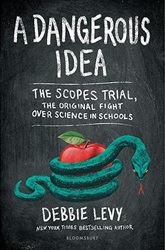
 A Dangerous Idea
A Dangerous IdeaBloomsbury Children's Books, 2025. 278 pages.
Review written October 8, 2025, from a copy I was given at ALA Annual Conference, signed by the author.
Starred Review
2025 Sonderbooks Stand-out:
#3 Teen Nonfiction
Lest we think that controlling what kids are taught is a new idea, A Dangerous Idea lays out for teens the media circus that happened in 1925 over a few lines about evolution in a high school biology textbook.
Debbie Levy lays out the whole case from roots to verdict and aftermath. She gives us the background of the two big-shot lawyers who faced each other in the Scopes trial. John Scopes was simply a young high school biology teacher who agreed to be a test case after Tennessee passed a law forbidding the teaching of evolution. The real media attention came because of the lawyers - William Jennings Bryan, who had run for president three times and drew huge crowds on the lecture circuit, versus Clarence Darrow, who had publicly challenged Bryan already and had taken famous cases trying to bring down the death penalty.
Although I'd heard of the case, (Of course I had!) I'd had no idea how much was involved and how huge it was in the attention of the entire country - even in the days before television. Thousands of journalists descended on the small town of Dayton, Tennessee, and spread the word about the trial.
So Debbie Levy is able to bring us a multitude of photographs from the time and newspaper clippings and editorial cartoons, and plenty of other material to illustrate the story and help it come alive. It turns out the jury didn't even hear most of the trial, because much of it was the argument that evolution isn't actually contrary to Scripture - but the judge ruled all that mattered was if the law was broken.
I do like the way the author connects the dots between the Scopes trial and backlash against science today. This is from the Epilogue:
Today, complaints about science in the classroom go well beyond evolution. Some parents and lawmakers don't want schools to teach about climate change. They don't want laws and policies to address climate change, either, because they think it's a hoax or not caused by human activity. This is contrary to scientific evidence. Cimate-change deniers found a friend in the White House in President Donald Trump. "I don't believe it," he said in 2018. "One of the problems that a lot of people like myself, we have very high levels of intelligence but we're not necessarily such believers" in climate change.
The COVID-19 pandemic, starting in 2020, also spurred epic resistance to science among large swaths of the American public and their leaders. When leading scientists - the preeminent experts on infectious and viral diseases - tried to guide the public on how to protect themselves from the novel coronavirus, President Trump called them "idiots."
And so, hgere are two persistent threads lifted from the pattern woven a century ago. First: ridicule. Anti-evolutionists at the time of the Scopes trial made fun of scientists because, as Will Bryan scoffed, "They cannot agree with each other." Will's mockery was a cheap shot - just as it was a cheap shot, a century later, to mock scientists for altering their advice, in response to new and evolving discoveries, on how to protect against getting sick or dying from the coronavirus. That is what happens in science as a result of ongoing observation, experimentation, and, yes, disagreement among scientists: knowledge evolves.
And second: lumping together science and belief, by couching science as something you "believe" in, or not. Forcing, or even strongly urging, people to "believe" in a creed (science) that doesn't appeal to them - that's a bad thing to do, isn't it? It's un-American, isn't it? But science isn't a religious creed. And religion isn't science.
I like that this book is aimed at teens - exactly the age of people the original Tennessee law was trying to protect. Give them the full story - and we may find teens are more discerning than adults think they are.
